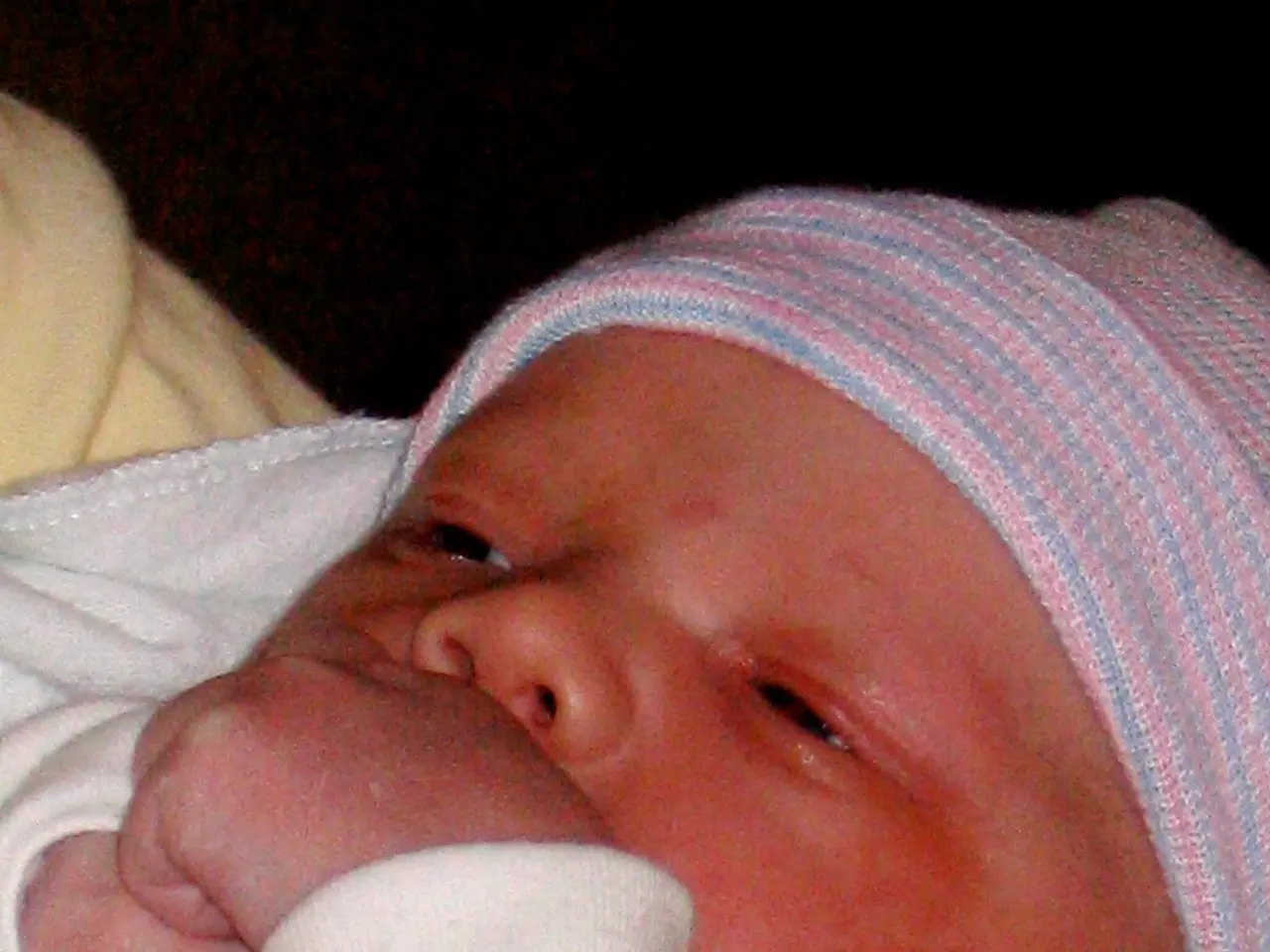Strategies for alleviating eczema itching in infants and additional suggestions
Eczema, also known as atopic dermatitis (AD), is a common skin condition that affects up to 1 in 5 babies. The main symptoms of eczema in babies are itching and red, raw, or weepy rashes. These often start on a baby's cheek at 1-6 months old but can spread to the rest of the face, outer arms, or legs, or where skin touches other skin.
To help manage eczema itching in babies, there are several home remedies and practices that parents can implement.
Home Remedies for Eczema Itching Relief
- Distracting a baby with an activity, such as telling a story or playing with a toy, can help them forget about their itch.
- Patting or pressing the skin gently instead of scratching can help reduce the urge to scratch and prevent skin damage.
- Keeping the skin well-moisturized with gentle, fragrance-free creams or ointments is essential for maintaining the skin's barrier and reducing itching.
- Giving warm (not hot) baths lasting 10 minutes or less using mild soaps can help soothe itchy skin. Applying moisturizer immediately after the bath while the skin is still damp helps lock in moisture.
- Dressing babies in loose-fitting cotton clothing and using cotton gloves or mittens during sleep can also reduce scratching.
- Using a humidifier to maintain moisture in the air can help alleviate dryness and itching.
- Avoiding triggers such as allergens, harsh soaps, and overheating can help minimize itching and irritation.
Preventing Eczema Flares and Skin Damage
- Trimming the baby's fingernails short and considering cotton gloves or mittens can prevent skin injury from scratching.
- Avoiding known eczema triggers by monitoring for and minimizing exposure to allergens, irritants like harsh soaps or detergents, and environmental factors such as extreme temperatures or sweat is crucial.
- Maintaining a consistent moisturizing routine with gentle, thick creams or ointments applied multiple times daily, especially after bathing, supports the skin barrier and prevents flares.
- Using cool compresses or colloidal oatmeal-based products can soothe itchy skin.
- Considering wet wrap therapy, which involves applying moisturizer, then a damp layer and a dry cotton layer over the affected skin, can help calm flare-ups and reduce scratching, although this is time-consuming and evidence is limited.
- Monitoring and managing stress as it can exacerbate eczema.
- Consulting healthcare providers about allergy testing if triggers are unclear.
Medical Treatments for Eczema Itching
- Doctors can prescribe medication to help with eczema itching at night.
- Wet wrap therapy can also be used overnight to soothe and rehydrate itching skin and make topical medications more effective. Caregivers should consult a healthcare professional before starting wet wrap therapy on babies.
- Diluted bleach baths can reduce skin inflammation and bacteria in babies with eczema, but professional advice should be sought before using this therapy.
- Biologic drugs, such as dupilumab, have been found to be safe and significantly improve eczema symptoms in clinical trials. Dupilumab has recently been approved for use in infants over 6 months and children 1-5 years old with moderate to severe eczema.
In most infants, symptoms will naturally improve by adulthood. However, there is no fast cure for eczema, and it is essential to manage symptoms with treatments or therapies. Washing new fabrics before use, such as new clothing, new bedding, new towels, blankets, and cloth napkins, can help prevent itching in babies.
Dermatologists recommend dressing a baby in clothes made with smoother fibers, such as super- or ultra-fine merino wool, to help with eczema itching. Eczema mittens can also help babies cause less damage when scratching, as they stop fingernails from digging into the skin when babies scratch their affected areas.
Researchers are also developing promising new eczema treatments, such as biologic medications. With consistent skin hydration, minimizing scratching, identifying and avoiding triggers, and gentle skincare, parents can effectively manage eczema itching and prevent flares and skin damage in babies.
- The home remedy of telling a story or playing with a toy can distract a baby from their eczema itch.
- Gently patting or pressing a baby's skin can help reduce the urge to scratch and prevent skin damage.
- Keeping a baby's skin moisturized with gentle, fragrance-free creams or ointments is essential for managing eczema itching.
- Giving a baby warm baths using mild soaps can help soothe itchy skin, with moisturizer applied immediately afterwards.
- Dressing a baby in loose-fitting cotton clothing and using cotton gloves or mittens during sleep can reduce scratching.
- Using a humidifier can help maintain moisture in the air and alleviate dryness and itching.
- Avoiding known eczema triggers such as allergens, harsh soaps, and overheating can help minimize itching and irritation.
- In some cases, doctors may prescribe medication to help with nighttime eczema itching, and wet wrap therapy can be used for both relief and making topical medications more effective.
- Diluted bleach baths, biologic drugs like dupilumab, and allergy testing are medical treatments for eczema that healthcare providers may recommend for infants, children, and adults with moderate to severe eczema.




